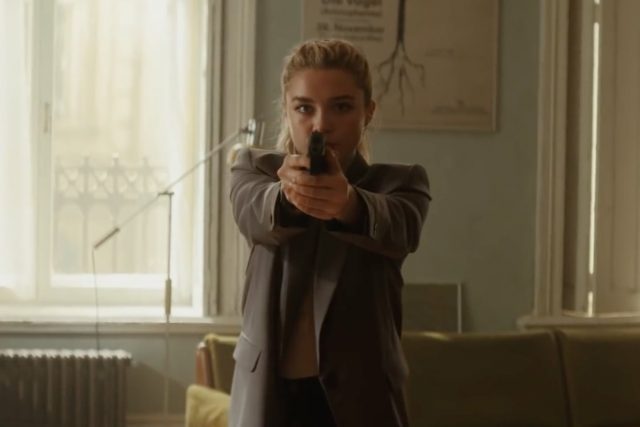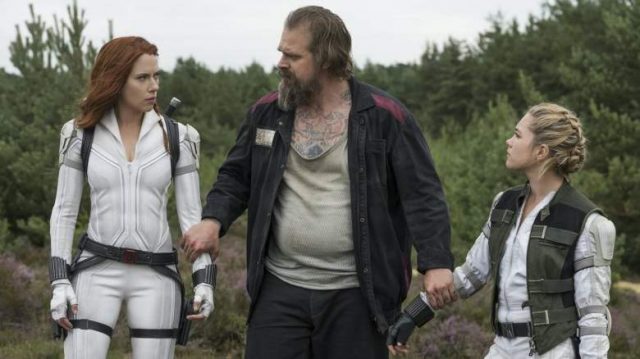NOTE: “Black Widow” is available to watch in theatres here in North America, and many other parts of the world, wherever theatres are permitted to be open. It is also available to watch at home on Disney+, via a one-time, “Premier Access” fee for the next several months, before becoming free to view at home for all Disney+ subscribers later this year. When possible, we recommend watching movies at home for the duration of the ongoing COVID-19 pandemic, for the safety of yourself and others. In the event that you do attend a movie theatre over the course of the ongoing pandemic without a full COVID-19 vaccination however, please consult and follow public health guidelines in your region, and do not attend movie theatres if you feel unwell, or have been potentially exposed to COVID-19 through a known positive case.
FOR REFERENCE: This review of, “Black Widow” is based on an at-home viewing via Disney+ Premier Access.
It’s pretty hard to believe that we’ve gone two full years without a new Marvel Cinematic Universe movie being released to the public. The franchise’s previous big screen offering, 2019’s Spider-Man: Far From Home, quickly shook off the falling high from the series’ previous climactic crossover movie, Avengers: Endgame, ultimately going on to become the first Spider-Man movie to gross over $1 billion worldwide, and the MCU was primed to keep that momentum going with the much-demanded Black Widow movie in 2020. Then the COVID-19 pandemic hit, resulting in a widespread delay for the MCU’s entire movie slate, a delay that forced not only Black Widow, but also 2020’s other planned MCU blockbuster, Eternals to vacate the year entirely. Even after an entire year without any MCU movies, an expected casualty of worldwide movie theatre closures due to the pandemic, 2021 similarly missed its first couple of reserved Marvel Studios movie dates in February and May, eventually forcing Disney to compromise with Black Widow’s over one-year-long delay by simultaneously releasing the movie for home viewing on Disney+, as well as in whichever movie theatres were permitted to be open around the world.
This obviously wasn’t the plan, especially when Black Widow was ultimately forced to trail the first two Disney+ original shows made for the MCU, WandaVision and The Falcon and The Winter Soldier. If there is an advantage to Black Widow losing over a year of release ground to the COVID-19 pandemic however, it’s the fact that the movie is an interquel, and a self-contained side story about a dead Avenger, one that doesn’t really affect the MCU’s main narrative path. Thus, the recent Disney+ misadventures of Wanda Maximoff, Sam Wilson, Bucky Barnes and Loki, as well as the progression and fallout of the battle against Thanos from the past two Avengers movies, haven’t happened yet during the events of Black Widow. Instead, Black Widow serves as something of a retroactive epilogue for Natasha’s character in this continuity, exploring one of the last key mysteries surrounding her MCU story; Her early life and family.

Building off that concept, it’s also inevitable that Black Widow would be smaller in scope compared to many other MCU blockbusters, which can work both for and against it. Natasha Romanoff getting a starring role in an MCU project feels undeniably overdue, ironically happening after she’s already dead in the current MCU era to boot, but this being a movie that seems to exist purely because of fan demand, you can imagine that its placement in the overall MCU canon can be… Dicey. Its over-arching mission feels ultimately inconsequential for the larger MCU narrative, practically by design, and while it’s predictably very well-produced and tons of fun, Black Widow doesn’t totally land with the big thematic splash that it could have. It’s a heartwarming and badass send-off for the late Natasha to be sure, but some may be disappointed that Black Widow’s examination of its subject’s morally complex background ultimately only goes skin-deep.
Black Widow centers around former S.H.I.E.L.D. agent and fugitive Avenger, Natasha Romanoff, going back in time to pick up in the immediate aftermath of 2016’s Captain America: Civil War. Due to her last-minute aiding and abetting of fellow Sokovia Accords-defying fugitive, Captain America in that movie, Natasha is on the run at this point, relentlessly pursued by William Hurt’s Secretary Ross, one of the only other familiar MCU faces to show up in this movie. Initially trying to lie low, Natasha eventually ends up reconnecting with her adopted sister, Yelena Belova, played by Florence Pugh, who passes on some chilling information to Natasha; The ‘Red Room’ that forcibly indoctrinated both Natasha and Yelena into Russia’s Black Widow assassin program has continued to operate covertly in the MCU, and Yelena wants to shut it down.
Immediately, Marvel fans will be able to decode what this family dynamic is meant to do; Position Yelena to succeed the dead Natasha as the MCU’s new Black Widow. That manages to be an exciting prospect as well, because Pugh is fantastic in the role of Yelena, easily keeping pace with Scarlett Johansson in terms of humour and ass-kicking. The sisterhood between Natasha and Yelena is one of the themes running most deeply throughout Black Widow, with Natasha’s lucid experiences hardening and disillusioning her to her life with her adopted Russian family, while Yelena, only recently liberated from the Red Room’s mind control, is desperate to cling to her idealistic childhood, and the purity of what she feels is a worthy surrogate family. This is one of the more successful thematic topics explored by Black Widow in fact, the idea that the Avengers are Natasha’s chosen family that have finally put her on the right path (albeit an ultimately tragic path, as Avengers: Endgame demonstrated), but even her fake Russian family still contributed greatly to her heroic identity, whether she wanted them to or not.

That surrogate family is rounded off by two ‘parents’, those being David Harbour’s Alexei Shostakov, and Rachel Weisz’s Melina Vostokoff. These two characters personify the dueling psychology behind Natasha’s idea of heroism and family, with Melina being an OG Black Widow graduate that’s since become a brilliant, if slightly unhinged Russian scientist, while Alexei, one of the few characters in Black Widow that actually does have superpowers, is a boastful, past-his-prime superhero called the Red Guardian, essentially a Soviet knock-off of Captain America, complete with super-strength. Harbour quickly proves to be a major scene-stealer in Black Widow as well, serving as a genuinely hilarious mockery of Chris Evans’ Captain America, one that’s obsessed with glory, and even claims to have battled Cap in the past with dubious anecdotes, only to ironically be shoved behind a desk by the Russian government many years ago, and eventually tossed into a Russian prison to be forgotten.
Alexei being an ironic reversal of the humble, yet glorified Captain America is not the only cracked mirror that Black Widow holds up to Natasha’s life with the Avengers either. Over the course of the movie, Black Widow and her allies are also forced to confront dangerous Red Room agent, Taskmaster, a mysterious character that sports the ability to quickly copy any fighting style. Taskmaster wields the combined skills of several established MCU superheroes over the course of Black Widow, sporting a Captain America-style shield, and combining that with the battle techniques of Spider-Man, Winter Soldier, Iron Man, Hawkeye and Black Panther, most notably. The mystery behind Taskmaster is also related to Natasha’s backstory, and while it’s initially intriguing, Taskmaster doesn’t end up being the truly compelling threat in Black Widow, ultimately being saddled with a ‘surprise’ reveal that’s not nearly as clever as the movie thinks it is.

In reality, Black Widow’s true villain is the architect behind the Red Room itself, Ray Winstone’s General Dreykov. This isn’t really a spoiler, because Black Widow emphasizes early on that Dreykov is the true threat of the movie, not to mention that past Avengers movies have already alluded to Natasha’s tense past with Dreykov. Sadly though, Dreykov is the latest disposable MCU villain, not really having much complexity or intrigue behind him, and instead simply being a boogeyman for Natasha and her surrogate family to pursue and stop. That’s especially frustrating after the MCU has taken such great strides in addressing its former ‘villain problem’ over the past few years, with Dreykov ultimately being a poor successor to much better MCU movie baddies of recent years such as Killmonger, Mysterio, and of course, Thanos.
Winstone plays Dreykov with more than enough menace to be sure, but he’s often hamstrung in the role, simply because it’s underwritten. Black Widow just doesn’t dig deep enough with its darker themes, like the Red Room being an obvious allegory for human trafficking, something brought up in passing, and never adequately examined or left up to audience interpretation. Even Natasha herself isn’t dug into to a truly meaningful degree here, with Scarlett Johansson simply doing a victory lap in the MCU with Black Widow, while conveniently avoiding any honest examination of whether Natasha’s, “Red ledger” could truly be wiped out by her time as an Avenger. Frustratingly, a lot of Natasha’s dark backstory appears to officially be reserved for audience imagination now, even after a dedicated Black Widow movie. While there are still several great new characters introduced here, many of whom are primed for future MCU appearances, Natasha herself is ultimately done a disservice by a headlining movie that just plays it way too safe with her morally grey character.
Despite its morally flexible protagonist, Black Widow’s storyline isn’t really that complicated. It’s a rather straightforward battle against the nefarious overseers of the MCU’s Black Widow program, one that touches upon Natasha’s early life to a minimal degree. It’s all very functional, effortlessly entertaining audiences with an action-packed MCU side chapter that reveals at least one way Natasha occupied her time before Thanos first came to Earth in Avengers: Infinity War. Yet for all its efforts to finally put Natasha in a starring movie role, Black Widow ultimately falls shy of its storytelling potential, peddling easy answers to Natasha’s trauma, while also appearing to be more focused on setting up new Black Widow successors for future MCU projects, rather than fully stretching Natasha’s character to interesting new highs and lows.
Regarding the posthumous question of whether Natasha ended up being a true hero in her MCU incarnation, Black Widow’s undemanding plot appears to answer this with, “Of course, because she’s an Avenger.” Needless to say, that’s not really a satisfying answer when it comes to one of the Marvel Universe’s most devious and unpredictable anti-heroines. Black Widow’s storyline may touch upon some especially dark themes for an MCU movie, but it doesn’t ever seem to have anything truly profound or interesting to say about them. Worse still is that having to go back in time to create a headlining adventure for Natasha during the MCU’s 2016 sometimes results in a few plot holes and head-scratching narrative elements that have now been introduced to Natasha’s character, especially when it comes to some mixed callbacks to Natasha’s early MCU roles in movies like The Avengers.

Still, Black Widow’s storyline isn’t exactly bad. It’s just disappointingly safe. It contains very few honest curveballs, and it never dares to actually change our perception of Natasha, now that she’s dead in current MCU time. Even by the standards of a spy thriller, this movie feels disappointingly rote, with Black Widow refusing to dig into the moral greys of a modern 007 movie, or deliver the unpredictable treachery that’s baked into the bulk of Mission: Impossible movies. Sure, Black Widow is an MCU movie, and the MCU is ultimately a feel-good franchise, but the MCU has still utilized characters like Iron Man and Captain America in particular to explore some very difficult, interpretive and morally complex ideas about the world we live in today. Natasha’s long-awaited solo movie deserved the same privilege, but instead, Black Widow opts out of forcing audiences to ask difficult questions about themselves or Natasha. It’s almost like the MCU itself is afraid to speak ill of the dead. Even then though, Tony Stark’s legacy still got posthumously re-examined and challenged in Spider-Man: Far From Home, so why exactly is Black Widow afraid to dig more deeply into Natasha’s worst memories, and not just her best ones?
(NOTE: The ‘Spoiler’ section, when clicked, discusses whether Black Widow has any post-credits scenes, whether it features any additional Marvel character roles of note, and whether it ties into any known future projects in the MCU.)
Regardless, Black Widow does contain one post-credits scene, unfolding at the very end of the credit crawl. This scene fast-forwards to the MCU’s present era of 2023, with Yelena visiting Natasha’s grave site, which is revealed to be in Ohio, where Natasha, Yelena, Alexei and Melina were set up as an undercover ‘family’ of Russian sleeper agents in 1995. Yelena is in turn visited at Natasha’s grave by Contessa Valentina ‘Val’ Allegra de Fontaine, Julia Louis-Dreyfus’ mysterious handler-type character who was first featured in the MCU’s second Disney+ series, The Falcon and The Winter Soldier, and was originally supposed to be debuted in this movie, before COVID-19 delays bumped Black Widow to eventually follow The Falcon and the Winter Soldier. Regardless, Val seems to employ Yelena as an independent assassin in the MCU’s present era, and as a ‘favour’, she gives Yelena an assignment that allows her to target the man believed to be responsible for Natasha’s death; Clint Barton, a.k.a. Hawkeye! This teases that Florence Pugh will reprise her role as Yelena during the upcoming Hawkeye series that’s coming to Disney+ in the near future, though this news was admittedly leaked by online scoopers already, no doubt a consequence caused by Black Widow’s 14-month delay.
There was also a rumour that indicated Robert Downey Jr. would reprise his role as Tony Stark/Iron Man in Black Widow. Unfortunately, Stark isn’t present in Black Widow’s final product though, meaning either this rumour was false to begin with, or the scene in question was ultimately cut. Instead, William Hurt’s Secretary Ross is indeed the only familiar MCU face to appear in Black Widow aside from Natasha herself (and technically Val), and even then, Ross is only featured in a small role. There are several mentions made of other Avengers franchise characters such as Iron Man, Captain America, Thor, Hulk, Black Panther and especially Hawkeye during Black Widow, plus many of their familiar fighting techniques are also wielded by Taskmaster, but beyond that, these characters are never actually seen in the flesh in this case.
Finally, on the note of Taskmaster, it’s a poorly-kept secret that Taskmaster is not Tony Masters in the MCU, like he is in Marvel Comics lore. For those curious, yes, Taskmaster has indeed been gender-swapped in the MCU as well. Now, the MCU’s Taskmaster is portrayed as Antonia Dreykov, the daughter of General Dreykov, who barely survives a bombing attempt by Natasha, perhaps the closest that Black Widow ever comes to trying to portray Natasha’s morally ambiguous side. As some suspected, Russian actress, Olga Kurylenko’s mystery Black Widow role is indeed that of Antonia/Taskmaster as well, with Kurylenko’s likeness being unmasked as Antonia during a third act twist that probably won’t surprise many viewers. Even so, Antonia is eventually liberated from Dreykov’s mind control, and lives to fight another day with the other freed Black Widows in the MCU, so it’s possible that we’ll see Taskmaster show up in the MCU again someday, possibly even as another agent of Val’s!
Black Widow is directed by Cate Shortland, a mostly unknown director whose most noteworthy directing credit before this was helming several episodes of Showtime comedy series, SMILF. Shortland was apparently recommended by Scarlett Johansson personally during production though, and like many formerly unknown or small-scale directors that graduate to the MCU, Shortland’s direction proves to be plenty adept here. In fact, Shortland seems to be particularly relishing the chance to direct Black Widow’s action scenes, which are surprisingly ambitious for an otherwise smaller MCU interquel. She also seems to particularly enjoy overseeing the rapport between Natasha and her Russian family, which naturally lends itself to the MCU’s trademark sense of humour very effectively.

It does nonetheless feel like Shortland was given the choice of making a more thematically impactful spy thriller or a Marvel-approved romp however, and she seems to have leaned more into the latter than the former. Perhaps Marvel and/or Disney executives got in the way here, but for all of Shortland’s attempts to address themes like lost innocence, human trafficking and broken families, Black Widow seems to ultimately shrug at the conversations that it purports to start. It skims the surface of trying to achieve something deeper with Natasha’s formerly unknown solo MCU adventure, but in the end, Black Widow feels resigned to being a popcorn thriller. That’s fine, but it’s tough not to feel like it could have been more than that, had it committed to actually exploring some uncomfortable subjects.
Of course, even if Black Widow’s darker edge is disappointingly superficial in the end, Shortland still manages to craft a fun, engaging action blockbuster. For better or worse, Black Widow fits right into the MCU’s pantheon of crowd-pleasing romps, delivering a colourful odyssey that nonetheless doesn’t wish you to think too hard about anything behind it. Again, this is fine, but considering that its eponymous character is now dead as of Avengers: Endgame, Black Widow more blatantly feels like a missed opportunity. Considering how compactly and inoffensively the movie manages to fit into the MCU’s earlier timeline as well, there isn’t really any wiggle room for a sequel that can dig deeper into Black Widow’s themes, at least not one where Natasha Romanoff is involved. There are plenty of other characters introduced in Black Widow that could pick up the baton left by Natasha, naturally, and maybe Shortland can take more risks with them someday, but for now, she seems more concerned with simply giving Natasha an enjoyable, gratifying send-off, rather than risking disturbing the character’s legacy and established audience perception.
Black Widow’s soundtrack is composed by Lorne Balfe, who manages to craft a positively haunting Marvel soundtrack with this solo spin-off movie. Balfe’s score makes a huge impression right from the jump, with an eerie, but superb cover of, “Smells Like Teen Spirit” that plays over Black Widow’s opening credits, one that precedes a series of compositions that shine with a methodical spy flavouring, as well as a sense of glorious Russian bombast. The Russian vocals and other such musical flourishes help to give Balfe’s Black Widow score more of a unique identity in the MCU’s earthbound music pantheon, one that exudes more darkness and less hope than your run-of-the-mill Marvel soundtrack. At best, Black Widow’s soundtrack even feels like something of an ironic funeral dirge for Natasha, contrasting the movie portraying Natasha’s character in her prime during an earlier era of the MCU, after Marvel fans and MCU followers already saw her tragic fate in Avengers: Endgame.

The rest of Black Widow’s sound design is similarly impressive, hitting surprisingly hard for a movie that showcases a series of regular human characters. Even when watching this movie at home, the action sequences and destructive bombast behind Black Widow help to push its otherwise smaller, more intimate scale a bit further, leading to engaging action beats that grab your attention so effectively that they legitimately steal all focus from the storytelling! If you have the ability to do so however, Black Widow’s audio suite is obviously best experienced in a movie theatre, where its spectacular action scenes hit hardest, and its soundtrack feels most unnerving and memorable.
Black Widow’s visual effects are naturally more limited in scope compared to the majority of Marvel Studios movies, considering that this interquel is about earthbound characters, most of whom don’t have any superpowers. The action scenes also feature a commendable commitment to handmade stunt choreography, which helps the battles throughout Black Widow feel more grounded and real, at least relative to the rest of the MCU. There is still some obvious CGI trickery of course, especially during the climax, which is rife with explosions and general carnage, but the limited visual effects actually prove to be fairly refreshing in this case, allowing Black Widow to function more like a spy thriller than a garden variety superhero movie.

The presence that exists to most frequently remind viewers that Black Widow is an MCU movie (aside from Natasha herself, of course) is Taskmaster, its supposed super-villain threat. Taskmaster is of course given a bit of a more grounded design to become more rooted in live-action in Black Widow, but the real impressive trick to Taskmaster here is capturing the character’s iconic ability to instantly mimic opponents’ fighting styles. This is a very impressive stunt effect that helps to nicely compensate for Black Widow’s somewhat shakier CGI-driven moments, to the point where it’s a little disappointing that Taskmaster is not ultimately given full agency as a villain in this case, and is instead forced to be the personified will of Black Widow’s true villain, General Dreykov.
Black Widow succeeds as a victory lap for Scarlett Johansson’s late Natasha Romanoff, being loaded with stylish action and no shortage of heroic flourishes that seemingly give us one last chance to enjoy Natasha’s appeal as an Avenger, before her character is potentially retired in the MCU forever. Those expecting a more boldly challenging and complex solo movie for Natasha however will likely be disappointed. Black Widow somewhat lets down its eponymous character with its very safe, unchallenging narrative, one that ultimately goes against what Natasha’s character has historically stood for in the Marvel Universe, and ostensibly stood for during her formative years in the MCU. Sadly, we’ll likely never see the worst side of Natasha in this universe now, since Black Widow seems content to be a one-off answer to longstanding fan demand for this very movie, a consolation prize for a dead Avenger that definitely had more stories to tell in this continuity.
Black Widow is nonetheless plenty fun though, especially after the agonizing two-year wait for a brand new MCU movie. It just could have been more than what it ultimately is, especially if Black Widow was allowed to do the unthinkable and embrace an R-rating, which would theoretically enable it to actually explore the dark, uncomfortable themes that it can only barely touch upon under the watchful eye of Kevin Feige and the House of Mouse. Alas, this is the downside to being part of the family-friendly MCU; Black Widow has to prioritize being a crowd-pleaser, an easy task for colourful characters like Iron Man, Captain America, Spider-Man, Thor and most of Marvel’s other best-known superheroes, but not Natasha, as she often exists in a different world than they do, even when she nonetheless steps up to fight alongside these heroes.

I suppose it would be fair then to say that Black Widow is a worthy epilogue for Natasha the Avenger, but not Natasha the person. There’s even a point in this movie wherein Yelena asks Natasha how she can reconcile being a trained killer that little girls idolize as their hero, which would be a good question to examine, if Black Widow bothered to ever bring it up again. The idea of Natasha Romanoff becoming a feminist icon for Marvel is indeed very strange in a way, but if nothing else, Black Widow proves she can hold her own in a starring movie role, if not keep pace with the MCU’s best and brightest.

